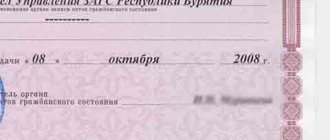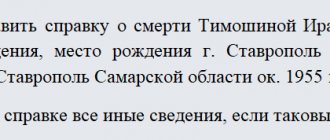After death, paperwork falls on the shoulders of the spouse, children or parents. Where to go after the death of a relative, what documents are needed? Below are steps to help complete the decedent's affairs.
Actions immediately after the death of a relative:
- Call an ambulance or a local doctor (if death occurred naturally).
- Obtain a death certificate from the registry.
- Contact the registry office (receive a death certificate with a coat of arms).
- At a funeral service bureau (to organize a funeral). Such organizations take care of all the hassles of burying the deceased: from transporting him to the morgue to burial and memorial dinners. However, it is worth entrusting negotiations with them to a close friend or relative, since in a state of severe emotional shock it is problematic to control both the proper fulfillment of their obligations and the final estimate of the costs associated with them.
- To the notary. Write an application for inheritance. Within six months, however, earlier is better.
- To the pension fund. If the deceased relative was a pensioner, to stop the payment of the pension. Relatives have the right to receive their full pension payment for the last month in full.
- Management organizations: housing office, water utility, electrical networks, solid waste removal company. In order to inform them about the termination of concluded contracts with the deceased. If this clause is not fulfilled, you can inherit the deceased’s property along with six months’ debts.
- To the bank. Write a statement about the client’s death in order to freeze his accounts until he enters into an inheritance or allows relatives to withdraw funds from the accounts.
What documents will be needed first in the event of the death of a relative?
Death certificate. Issued by the registry office, based on the passport of the deceased and a certificate issued by the medical institution, which confirms the death. The certificate is issued in a single copy. Her loss is unacceptable!
Together with the official certificate, relatives are given a funeral benefit (filled out form).
What documents are needed to conduct a burial?
For burial, including cremation, you need:
- Protocol of examination of a deceased person (issued by the police).
- Medical death certificate (issued by morgue workers or clinics).
- Death certificate (issued by an ambulance or clinic doctor).
What documents should I fill out after the death of a relative within six months?
As soon as possible, you should contact a notary with an application to enter into an inheritance. The paper will be issued after six months, but it is necessary to find out exactly what property (real estate, vehicles, bank accounts, company shares, etc.) the deceased left. The heirs are not always informed about the true state of affairs. Therefore, official requests are made to the relevant authorities in order to clarify the entire inheritance mass. This requires a fair amount of time. In addition, the notary is obliged to find out how many people can lay claim to the property belonging to the deceased. A huge help to families in which a person who was the sole breadwinner has died is the fact that the notary has the right to allow them to use the funds stored in the bank at the time of the death of the relative.
What to do if a relative dies in hospital
If a relative dies in a medical institution, part of the burden falls on the shoulders of doctors and nurses. The attending doctor or nurse informs the deceased's relatives about the death, declares biological death and sends the corpse to the morgue.
What should the relatives of the dying person do in this case?
Upon receiving notification of death, relatives should take the following steps:
- Call the city funeral service or a private funeral salon;
- Appear at the morgue to receive a certificate;
- Visit the registry office with the entire list of documentation discussed above to draw up a stamp death certificate.
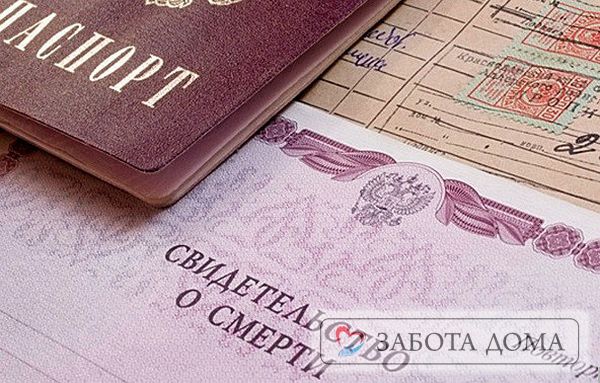
What to do if a person died unexpectedly or accidentally?
If death occurs as a result of an accident, unforeseen:
- An ambulance should be called. The corpse is taken to the morgue. There you can later receive a death certificate.
- If there was an accident resulting in death or murder. Call an ambulance and the police. Similar to the first example, with the difference being whether the employees establish the fact of a person’s violent death or not. If found, an investigative investigation will need to be conducted. If a person is killed, a criminal case will be initiated. Relatives of the deceased will be notified.
- The body of a deceased person must be taken to the hospital for a pathological examination, then to the morgue (carried by an ambulance and special personnel).
- Organize the funeral. In case of investigative activities, permission from the police for burial is required. If cremation is planned, the prosecutor's decision.
A loved one died in the hospital - who should he turn to?
It may happen that a person meets his death in a hospital. In this case, the corpse is immediately sent for a forensic medical examination or an autopsy at the prosektura.
If at the time of death none of the loved ones were nearby, then the attending physician or nurse calls them and tells the sad news to the relatives.
Also, the medical officer informs the relative of the deceased about how and where to obtain a death certificate . As a rule, this paper is issued at the morgue registry.

To receive it you need to have the following with you:
- Identity card of the deceased.
- Compulsory health insurance policy.
- Personal passport.
After issuing a death certificate, the document must be issued at the registry office, and there you must receive a certificate to receive a funeral benefit. Then you need to start preparing for the funeral personally, or with the help of a funeral agency.
Reference! The body of the deceased is stored in the hospital morgue until it is transported to the city morgue or burial site. The day, time and place of transportation are determined at the request of the relatives.
In the video, a forensic expert describes the algorithm of actions in the event of the death of a loved one:
What to do if a relative or loved one dies abroad
An application for the death of a person is submitted to the registry office at the place of the incident, as well as to the consulate of the Russian Federation (or the country of which the deceased relative was a citizen and ensure that an entry is made in the register).
Contact the morgue with the deceased relative’s compulsory medical insurance policy, passport, medical card of the deceased relative, and also attach the examination report of the deceased and the applicant’s passport, where they will issue a medical certificate of death.
Based on a medical examination, obtain at the place of residence of the deceased a death certificate on stamped paper and a completed form 33 (certificate of death).
At the embassy or consulate, employees of organizations are obliged to provide all possible assistance and support, both in registering the death of a relative and in issuing the necessary documents related to this. Among other things, assistance is provided in transporting the deceased to their homeland. All expenses associated with organizing the transportation of the body and completing the necessary papers are paid from the funds of the compulsory medical insurance issued before traveling abroad. If the deceased took out insurance, the company that insured him will pay most of the costs.
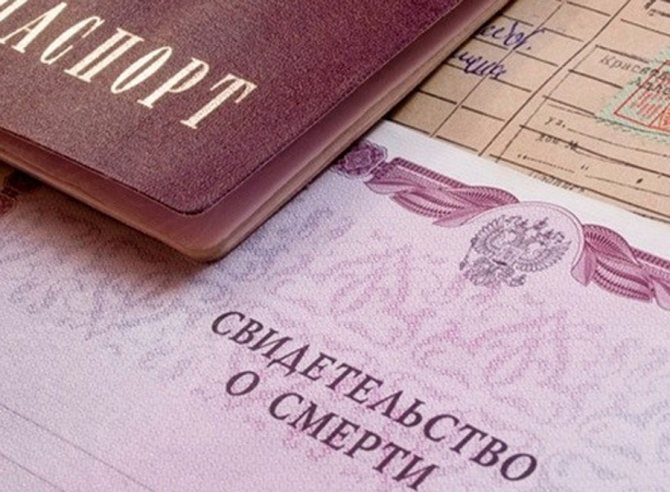
Exceptions are cases in which the deceased committed an intentional offense, suicide, as well as in the case of the use of narcotic or alcoholic substances. In addition, it will be difficult to obtain payment if the deceased participated in strikes or was listed as an employee of the security or military forces.
The main documents of title for sending a deceased relative are a passport of the deceased with the proper stamp, a certificate of his death, which states that he died abroad. The document must be certified by a notary.
It is important to note that the death form is not sufficient to issue a death certificate issued by the Civil Registry Office. If the certificate was issued by an emergency doctor on the spot or was issued by a local doctor, it is also necessary to go to the clinic, show the passport of the deceased, the form filled out at the scene of the incident with the fact of death, and the applicant’s passport. In addition to the above, you will need a medical card of the deceased (must be kept in the registry). An outpatient card of the deceased will also be required, which, however, should be located in the clinic.
The registration procedure is the same both in the morgue and in the hospital. The outpatient card should not be provided in these institutions.

Who is considered a close relative?
The above-mentioned article of labor legislation does not in any way decipher the wording “close relatives”.
Therefore, in this case, the employer will have to be guided by common sense and other legal norms.
For example, in the Family Code such relatives include (Article 14):
- R

parents (such persons are defined in relation to their own children); - grandparents (defined in relation to natural grandchildren);
- sisters or brothers (even if the degree of relationship is only through one blood line, that is, the brothers or sisters are half-sisters).
It is noteworthy that spouses are not recognized by law as close relatives, but at the same time they are often considered relatives (as persons having the same blood line).
As for the Criminal Code, in addition to the listed categories, relatives include adoptive parents and persons adopted by them. And housing law classifies family members as both blood relatives and spouses (persons in special social relationships).
How to receive compensation for the funeral of a relative?
Insured citizens have the right to receive compensation payments for funeral services. They can be obtained on the date of application, when submitting an application to the relevant authorities in the presence of a death certificate issued by the Civil Registry Office. Compensation is given by:
- The organization for which the deceased person worked and was insured.
- The body where the deceased's pension was calculated.
- Social security department at the place of registration, if the deceased person was not insured.
Package of documents for receiving compensation:
- Applicant's passport.
- A certificate confirming the death of a relative.
- Application of the specified sample.
- A certificate from the cemetery indicating the grave number
- A work book or other document confirming that at the time of death the deceased was not working anywhere.
Please note that original documents must be submitted.
Obtaining a death certificate
After the fact of death has been established, the corpse is sent for a forensic medical examination or to the morgue, where it will be stored until the funeral.
A death certificate is issued the very next day after the fact of death is established. To obtain this document, you must contact the district registry office to which the deceased was assigned during his lifetime.
Who can get a death certificate is described in the video:
General rules for inheritance for children
In order not to encounter unforeseen situations, it is necessary to have grounds for entering into an inheritance after the death of the parents.
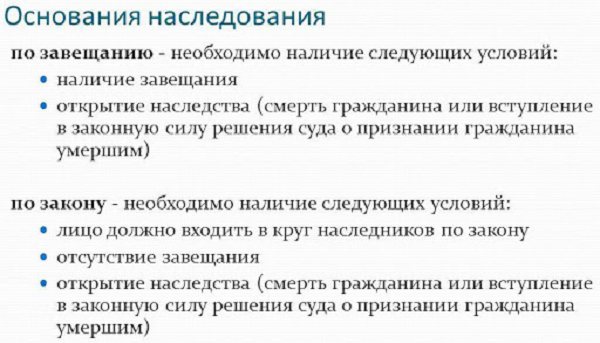
You should also know the main legal postulates of this process:
- The totality of the rights and obligations of the testator (the estate) includes both the assets of the deceased and his debts . The heir cannot accept the property and not bear the burden of the deceased parent.
- Minor children inherit property by default. The guardian may refuse the inheritance only after agreement with the guardianship department.
- An equal part (regardless of the presence of a will or its absence) is received by persons who were dependent on the deceased . They have the right to demand a mandatory share. When the heir is not a blood relative of the deceased, the fact of dependency is proven through the court.
- It happens that at the time of the death of the testator there is a pregnancy and by the time the inheritance is opened the child has not been born, then the entry procedure is postponed until the end of the birth. In the event of the death of the infant, the inheritance is canceled. Inherited property is divided according to the justified right to a share in the property.







